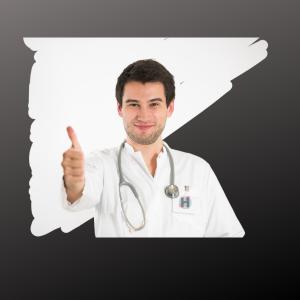
____Table of Contents____
~ Our Story
~ How To Find A Doctor/Oncologist- 7 Tips
~ New Graduates Versus Experienced Practitioner
~ Freebie
~ Where We Went
~ References
So the doctor just told you that you have CANCER!!! I’m sure it sounds like someone else’s life. I know when my husband, Barry, received the results of his MRI, showing three brain tumors, panic set in.
We couldn’t find a doctor/practitioner fast enough!!!
If you read my About Me page, you’ll know I reacted fast! Too Fast!!
As I’m sure many of you did, I ran to the internet and started searching for the best practitioner for cancer in my region (especially focused on big cities). What would I say to that scared girl back then? Breathe!! Cliche right? Sooo true!
You need to be thinking clearly for this next step, so breathe and allow yourself to digest first. Hug your loved ones!
Let’s start with the correct name. You’re searching for an oncologist. Oncology is a branch of medicine concerned with the prevention, diagnosis, treatment and study of cancer.1
I will say we had a Neuro-Oncologist who ran Barry’s plan of care. We didn’t find a doctor in the traditional way, we started backwards (because as I said before, I panicked and used family connections to get a quick appointment with a Neurosurgeon).
After starting with a Neurosurgeon we actually had a misdiagnosis. This was absolutely no error on the doctor’s behalf, what Barry had truly mimicked a different diagnosis initially.
We were then referred to a Neuro-Oncologist and this is how we began to build a team of involved practitioners. I say practitioners, versus doctors, because our team had Nurse Practitioners, Dermatologists, Nurses, Doctors… so many people involved and some of our favorites weren’t even doctors.
We went into it looking to find a doctor, we ended up with a network of invested human beings, who cared for us like family.
Oncology (Hemato-Oncology) joined our journey later, when my husband was an inpatient, after a surgery to remove a tumor. At least that was our assumption. What we didn’t realize at the time, was all of the talk and collaborating that happened behind the scenes. The oncology team was already aware of our case.

We were blessed to be at a hospital that collaborated on a regular basis. Tumor Board they called it. This meant they regularly met regarding all of their current caseload (patients they were actively seeing).
Everyone offered input as to what their department may be able to offer to the patient.
For example neurosurgery would weigh in as to whether, or not, the patient could benefit from a surgical option and oncology may discuss a new clinical trial with a certain MEK inhibitor that might be an option. A nurse practitioner may weigh in and remind the team that the patient had stated they didn’t want to take part in any type of chemotherapy.
I feel like there’s a large benefit to getting all of your questions in, before such a group meets, so it can be discussed while all of these big brains are all sitting together discussing your case.

Remember, your doctor is a human being. Give them proper time to review and be prepared. Whether an accountant is looking over your taxes, a mechanic taking your car into the shop, or someone restoring your fireplace hearth, people don’t tend to have 100% of the answers on the tip of their tongue at any given moment to delve out the best advice on a moment’s notice (especially when they’re experienced)!
Give your practitioner time to look through their resources, bounce ideas off their coworkers and prepare. Afterall, you want the best answer, not the first one that comes to mind. I always say:
“Don’t fear the practitioner who looks at their books, fear the one who never does.”
I certainly don’t want ego getting in the way of best care. There are so many options and so many variations, that not everything is retained in a doctor’s memory banks for quick access.

How To Find An Oncologist– The How To Find A Doctor- 7 Tips I Promised You!
- Decide how far from home your family is willing to travel

This should always be your first step. Don’t get super excited to find a doctor at some New York Cancer Center that promises great results, just to later realize it’s beyond your reach. Remember, you’re likely about to have to be at this location often, so be reasonable. We had kids in school to have to consider. Weigh it all out.
- Research that region’s hospitals
So now that you’ve made your decision as to what is reasonable traveling distance for your family, it’s time to start researching. If the area is large and you have the money and ability to travel far often, that’s great!
Most families fall into the category of needing to find a doctor within a couple hours of their home. Start making a list of all of the hospitals around and start taking notes.
- Go online
Type in best (fill in your specific type of cancer) oncologists in (fill in the area you decided is acceptable distance for you to be able to travel to frequently) region.
Example: Best Hodgkin’s Lymphoma Oncologists in Houston, Texas region. Every type of cancer is different. No such thing as “best cancer doctors in my area,” or “find a doctor for cancer.” Truly, being specific is important here.
You may not know what type of cancer it is yet and that’s the reason you’re needing to find a doctor to find answers; in that case, start with just good, nearby cancer centers, or well-known hospitals for having excellent care. Remember this doesn’t have to be the final doctor you see, it’s just a starting point.
- Breathe again!
Remember knowing that you have cancer is a gift. With this knowledge, you can start seeking a solution. You’re already taking action, simply by finding the right, next step.
- Start looking at each of these hospital’s directory.
This is a section on the hospital website where usually there is a search for practitioners at the location. This is the one place that ‘Find a Doctor’ is a good place to start. You can type in a specific specialty and see who comes up. Take your time here. Each hospital website is different.
Sometimes it’s easiest to start with looking into the hospital oncology department and read up. See how their treatment approach sounds. Does it work with what you’re wanting for care?
Sometimes you can then go back a step and search people’s personal experiences online with that particular hospital. Whenever you do that, please remember people mostly write those when they’re either pissed off, or had exceptional care, rarely stories in between, so don’t solely rely on that. I do, however, look for patterns, or commonalities in experiences. There’s usually a little truth in there.
- Ask friends and family.
This may not be an option for you, I know it wasn’t for us. We weren’t ready to share our story with the world yet, until we had more answers. A couple, close family members were our only exception.
If it’s not an option, ask your primary care provider or, ask around in more of a broad way… “Out of curiosity, how did you ever find a doctor for your cancer?” Ask someone you know who had a positive cancer outcome where they went for their care.
- Second opinions

This is super important! You are not tied to the first doctor you see! Let me repeat that, you are not required to stay with the first person you go to!
I’ll admit, with the mounting hospital bills and so many unknowns, we were nervous that a second opinion would be denied by our insurance company and we’d be stuck with a very expensive opinion; that may be the same as the first! Really this is an easy fix- call your insurance provider. We never did, but we never got stuck with a bill other than our deductible and copays. I think for peace of mind, just call and see what they say.
As for those who are nervous about telling their current doctor that they want to get a second opinion, because they fear they will insult them- don’t be! Talk to your provider. Ours constantly reminded us that it was completely okay to do that. They actually are the ones who eventually sent us elsewhere to see colleagues of theirs, who they thought may have additional insight and/or clinical trials we may qualify for.
It provided us with peace of mind that we were in fact getting the best care where we were. Ultimately, if a doctor is confident in their diagnosis, they should not be threatened by another doctor’s eyes on your case.
When I got my Doctorate, (please see my disclaimer– I’m not an Oncologist!) I always tried to stay humble. I never let a patient call me Doctor. This one woman insisted (I know you can’t see me right now, but this was an eye roll moment for me).
As a marketing tool, my employer had listed my title on our company website and this particular patient had specifically asked to see me, as opposed to my peers with more experience, just because of my title. My colleagues in my office had Bachelor’s and Master’s Degrees, as opposed to a Doctorate. She literally just wanted to find a doctor!
I can admit, I took some coursework that my coworkers hadn’t, as well as producing an additional research paper (an article entitled How Physical Therapy Could be an Intervention for Couples Having Difficulty Conceiving). Hardly relevant to this 60+ year old patient who wanted my bonus expertise! Honestly, other physical therapists at our practice had more patient experience with her diagnosis- years even!
So let’s go through some pros and cons in my personal experience.
Newer Graduates

- Fresher to the business (let’s face it, this can be a pro or a con!)
- Sometimes more excitement/enthusiasm. Something to prove doesn’t hurt and sometimes not having had failure, optimism can prevail.
- Potential for exposure to more cutting edge treatment approaches. When you’re in school, the most recent advances are being presented to you and sometimes a more experienced peer may be too busy with patient care to stay abreast of the latest and greatest at all times.
- More recently having heads in the textbooks. Similar to the last statement, a more recent grad will have likely had to brush up more recently on all things: anatomy, techniques, options, risk factors…
- Time to research details of your case. One of our favorite people was a new nurse practitioner who, having recently started in her position, had less people calling her, less patients on her caseload, more open time slots…. This frankly just made her more responsive! We had answers to our questions more readily and she took on a lot on our behalf. We love you forever Madeline Couch NP (and something tells me, as full as her caseload is these days, she’s still just as responsive)!
Experienced Practitioners

- Experience!! Need I say more? You may feel like less of a guinea pig. They may have tried more options to be able to compare outcomes better.
- More reviews. More reviews = more information. Let others tell you how they’re measuring up!
- Practice makes perfect…. well not perfect, but hopefully improvement!
- More access to collaboration, because their networks may be larger at other hospitals.
- Better gage on prognosis, or timeframes for expectations. Who knows better than someone who has been through it time and time again. They know what to look for when X happens, they know how typically progression goes when Y is the path and they know which way to turn if the unexpected Z rears it’s head! This can be very comforting.
***To be clear, I’ve seen more experienced doctors who look more like the first photo and newer grads who resembled the second photo. Age isn’t the factor here!
I know experienced doctors who I wouldn’t trust with a hamster and I know people who don’t even have a high school diploma, who I would trust with my life. That being said, I also know new grads who I question how they put their shoes on in the morning!

So choose wisely. Read reviews, ask friends (or even the girl at the front desk). Look for certifications, awards, research articles, but most importantly trust your gut.
Don’t be afraid to walk away. Don’t be afraid to offend. Let me repeat that. Don’t Be Afraid To Offend. The best doctors should never be offended by a second opinion! Not to mention, no matter how things turn out, you have to be able to look yourself in the mirror at the end of it all and know that you saw the best and did the best you could.
My personal advice really comes down to this:
- Do your research
- Find a doctor (to start with) who seems good and can see you right away
- During that time, be researching the best around in your cancer specialty and get an appointment with them too
FREEBIE TIME!
Once it’s appointment time, you want to be prepared. Check out one of my favorite Freebies for a checklist of questions you can print and take with you to your visit.
It also covers what else you need to bring to the visit to get the most out of it! I SO wished someone had handed me this before we started. I’ve had so many people thank me for this one nugget!
Here’s how- So Easy!!
All I need is your email so I can send it to you!
If only curing cancer was so easy…
For now, just breathe, you’re stronger than you realize!
Side note for those who are wondering–
In the end we had Tufts Medical Center for the majority of his care.
Beth Israel gave us a second opinion.
Memorial Sloan Kettering took a look at his labs to verify diagnosis and treatment.
- This is a great thing to do without any costs, or having to travel at all, if you have a tumor that’s been removed and can be evaluated. Many of the top hospitals in the cancer world offer this. Just look into it online, or call to see if it’s an option. Our hospital (Tufts) organized sending the tumor sample and everything else that went along with it.
Massachusetts General took a look at some labs because they had a certain microscope (if I’m remembering correctly) that could give us more answers.
Dartmouth Hitchcock Medical Center saw Barry for immunotherapy, because they were closer for us, fully capable, and an amazing group of people who were in support of the same steps recommended to us by Tufts!
Did we encounter any bad experiences? Of course!
*One doctor, we were hoping was coming in for a consultation to offer another treatment option, one of our last options actually. He, more or less, told us we were wasting his time. Right. So after some tears and picking ourselves off the floor, (we were actually alone- him in the hospital and me at home because COVID-19 restrictions) we found our next fabulous doctor. The list of the amazing ones wouldn't even fit in this blog!
Cancer is truly a team effort. No hurt feelings, just everyone scrambling for a cure.
I remember, very well, just how overwhelming it was to find a doctor to treat your, or a loved one’s, cancer.
Stay calm and in control to find the best match for you. Remember, what’s best for one person may not work at all for the next person. Good luck and you’ve got this!
Oh ya! Don’t forget to subscribe so I can keep helping you- Starting with your freebie! I’d love to follow you on this journey and offer you helpful tips! Time is everything and I’d love to save you some!
References
1Merriam-Webster. (n.d.). Oncology. In Merriam-Webster.com dictionary. Retrieved July 26, 2021, from https://www.merriam-webster.com/dictionary/oncology
Feel free to come back and share in the comments section any tips that worked for you after you found your team! Let’s pay if forward! How’d you find a doctor?
13

